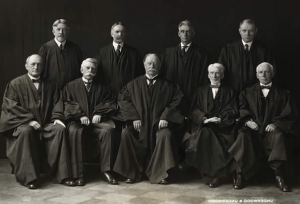 The Supreme Court ruling was a lopsided one. The court voted 8-1 against the plaintiff, Carrie Buck, and she was forced to undergo a procedure to be sterilized against her will.
The Supreme Court ruling was a lopsided one. The court voted 8-1 against the plaintiff, Carrie Buck, and she was forced to undergo a procedure to be sterilized against her will.
The 1927 ruling in Buck v. Bell stated that it was legal to have what were deemed “feeble minded” individuals sterilized so they wouldn’t pass along mental defects to children that the state would then have to support.
Former New York Times editor Adam Cohen says it appears that Carrie Bell wasn’t “feebile minded” at all. Her greatest liability, it seems is that she was poor, and an unwed mother.
When Bell became pregnant, possibly as the result of the rape by a relative, her foster family had her committed to a colony for epileptics and “the feebleminded.” These colonies were formed on the principles put forth by the eugenics movement.
“It was very common to read about eugenics in national magazines; magazines like Cosmopolitan,” Cohen says. “It became a really popular movement nationwide.”
Eugenics was also the basis for Hitler’s Aryan purity philosophy, which was developing at the time of Buck v. Bell.
With Hitler’s rise and World War Two, eugenics fell out of fashion in the United States. In turn the practice of sterilization ended.
Many scholars list this case, along with the Dred Scott case of 1857, as one of the prominent black marks in the history of the Supreme Court. Yet, Buck v. Bell has never been overturned.
“We have a ruling that is still good law that says if states want to do this, if Congress wants to do this this is all fine,” Cohen says. “This is something that’s constitutional.”
Adam Cohen is the author of “Imbeciles: The Supreme Court, American Eugenics, and the Sterilization of Carrie Buck.”
Listen to the interview: Adam Cohen on The Steve Fast Show
Follow Steve Fast on Twitter @SteveFastShow






